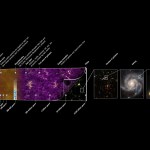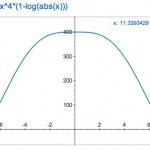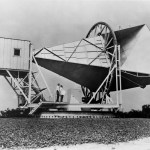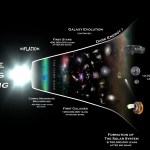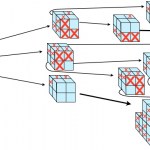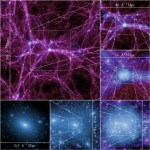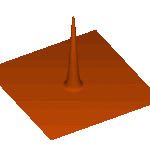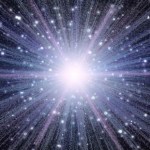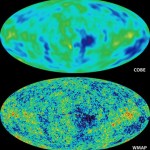cosmological
"The joy of life consists in the exercise of one's energies, continual growth, constant change, the enjoyment of every new experience. To stop means simply to die. The eternal mistake of mankind is to set up an attainable ideal." -Aleister Crowley
But the Universe itself experiences continual growth, constant change, and new experiences all the time, and it does so spontaneously.
Image credit: ESA and the Planck collaboration.
And yet, the better we understand our Universe -- what the laws are that govern it, what particles inhabit it, and what it looked/behaved like farther and…
"Despite its name, the big bang theory is not really a theory of a bang at all. It is really only a theory of the aftermath of a bang." -Alan Guth
So you finally understand it. The Big Bang tells us that the Universe was hotter, denser, and expanding at a faster rate in the past.
Image credit: original source unknown.
The farther back we go, the closer together everything was, the higher in temperature (and shorter in wavelength) all the radiation was, and -- of course -- the younger the Universe was.
Image credit: Ned Wright (possibly Will Kinney, too), via http://ned.ipac.…
"Orbiting Earth in spaceship, I saw how beautiful our planet is. People, let us preserve and increase beauty, not destroy it!" -Yuri Gagarin
Fifty-two years ago today, the first human being left Earth, and we began our journey into outer space. But back in 1961, we didn't really know how far outer space stretched, or where all the matter and energy in the Universe came from.
Image credit: NASA, 1962.
That all changed with the discovery of the Cosmic Microwave Background (by Penzias and Wilson, with the Horn Antenna, above), and subsequent measurements that led us to the Big Bang picture of…
"Much later, when I discussed the problem with Einstein, he remarked that the introduction of the cosmological term was the biggest blunder he ever made in his life. But this “blunder,” rejected by Einstein, is still sometimes used by cosmologists even today, and the cosmological constant denoted by the Greek letter Λ rears its ugly head again and again and again." -George Gamow, the father of the Big Bang model
The Big Bang -- the prediction that the Universe started from a hot, dense, rapidly expanding state -- tells us where our cold, star-and-galaxy-rich, slowly expanding Universe full of…
“The aim of science is not to open the door to infinite wisdom, but to set a limit to infinite error.” -Bertolt Brecht
One of the most frequent questions I get about the Universe -- as a cosmologist -- isn't quite about the Big Bang in and of itself.
The expansion of the Universe in reverse; image source unknown.
The Big Bang is a remarkable idea, of course, that says that, based on the observations that the Universe is expanding and cooling today, it was hotter, denser, and physically smaller in the past. This gets particularly exciting when we extrapolate very far back in the history…
"You must learn to talk clearly. The jargon of scientific terminology which rolls off your tongues is mental garbage." -Martin H. Fischer
I've always thought that the Universe is absolutely amazing; that everything from the tiniest indivisible particles all the way up to the largest structures and superstructures making up the Universe has an amazing story to tell, if only we can figure out its secrets.
Image credit: Boylan-Kolchin et al. (2009) for the Millenium-II simulation; MPA Garching.
When I first learned some of them for myself, I was a graduate student, immersed in the minutiae and…
So as a full member of both the American Astronomical Society and the American Physical Society, I get sent issues of the magazine Physics Today. Well, I was going through the April issue, when I saw this article:
Cosmic Sound Waves Rule
by Daniel J. Eisenstein and Charles L. Bennett
That first name sounds familiar. Why? Because he's my boss! The article requires a subscription, but seeing as how this is what my research is, why don't I tell you what the big idea is.
The Universe is full of dark matter, normal matter, and radiation. When it's young, the radiation is more important than matter…
Since the dawn of time man has yearned to destroy the sun. - C. M. Burns
There's no need to stop at the Sun, though. Since yesterday was Earth day, I thought it was only appropriate to spend today telling you how not only to destroy the Earth, but to effectively destroy the entire Universe. To tell you this story, we have to go all the way back to the beginning, to just before the big bang.
The big bang was when the Universe was hot, dense, full of energy, and expanding very quickly. The Universe was also spatially flat and the same temperature everywhere, and full of both matter and…
The cosmic microwave background is the radiation left over from the big bang. It's very uniform, 2.725 Kelvin everywhere. We're moving with respect to it, so there's a doppler shift, and we see that as a dipole moment in the Temperature. When we subtract that out, we see variations on the order of 30 microKelvins! WMAP is a satellite (Wilkinson Microwave Anisotropy Probe) that measured these anisotropies, and they just released its year 5 data. First off, with the uniform and dipole parts subtracted out, and with the foreground from the galaxy also taken out, here's the map of the microwave…
